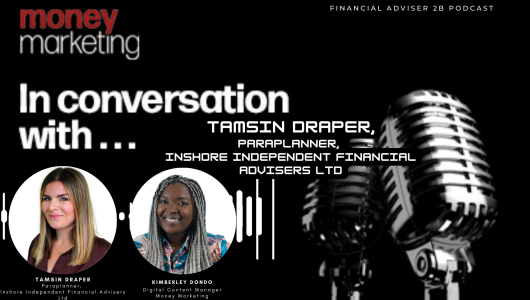‘Tonight, Matthew, I’m going to be….’
This is one of my first thoughts when I meet Tyndall Investment Management CEO Alex Odd.
It has been prompted by an incredibly quick wardrobe change on his part. (Some readers may recall those immortal words being uttered by contestants on the former TV programme, Stars In Their Eyes, before they revealed which famous singer they were going to impersonate after being transformed by the costume department.)
Odd’s train was delayed by a combination of train strikes and snow, so he has arrived for our MM Meets appointment slightly later than planned, and wearing casual clothing. He gives a polite greeting then disappears to his office to change.
For us to tell advisers what their clients think is utterly ridiculous
Just moments later a suit-clad Odd returns, reminding me instantly of those Stars In Their Eyes contestants, emerging through the smoky doors miraculously restyled as their chosen singer. I resist the temptation to ask him for a song.
Odd is not just the CEO of Tyndall but also its founder. As we sit in the head office in London, which is beautifully situated right next to Westminster Abbey, he tells me how the investment management house came into existence, starting with his own career journey.
From fund manager to CEO
Odd graduated from the University of Manchester in 1995, having studied both politics and history. In the course of his degree he drifted towards political history, with a particular interest in the evolution of Greek classical democracy and liberalism.
“I was lucky enough to do a degree in something I was interested in,” he says.
No one is here for the money. They are here because of what they can do
His first employed role was at PricewaterhouseCoopers (PwC) as a trainee auditor, where Odd wanted to obtain a professional qualification to help him in the job market. As a fellow history graduate, I understand this — while at university I was often asked, “What do you want to do after graduation?”
However, Odd recalls that, just five months in to his accountancy qualification, “it was very clear that this was not for me”.
After his departure from PwC, someone introduced him to Jupiter Fund Management.
“It was growing very quickly and they kindly offered me a job,” he says.
Odd started in Jupiter’s marketing department, where he produced reports and accounts for funds. This entailed spending a lot of time with fund managers and, a couple of years later, he was asked to move into fund management.
He became assistant manager of Jupiter’s flagship income trust fund.
The way we run the company is that we are one team
A few years had passed when Odd received a phone call from M&G, with “a really interesting opportunity” to run its dividend fund. M&G had built a talented team of fund managers, so he made the switch.
“For my two main periods of employment before Tyndall, I was lucky enough to work with people who were absolutely at the top of their game,” he observes.
Odd believes that a key part of successful investing is the way in which people respond to adversity. He says the 2008 financial crisis taught him that “it’s not about when things are great and going up; it’s about when things are tougher”.
A happy accident
In November 2014 Tyndall Investment Management came into being, almost by accident.
“I had no ambition at all to run a business,” says Odd, “but I have ended up running one.”
It is about finding the right people to join Tyndall and, if they happen to be in York, we will happily open a York office
For a while, Odd had been feeling that what he attributed value to “was less available [at M&G], so we agreed to disagree on that”.
On leaving the firm, all he wanted was to run a small income fund in his own way rather than how other people thought he should.
He was introduced to an investment firm called Valu-Trac by two former Baillie Gifford partners. Valu-Trac allowed him to launch an income fund, which pleased him greatly, so Tyndall’s genesis was as “a single-product, single-person business”.
When Odd went out to seek support for his fund, he soon realised that the frustrations he faced were industry wide.
Advisers are the cornerstone of a successful fund, so Tyndall likes to speak to as many of them as possible
“But it was nothing in comparison to some of the pressures being felt in the private-client space,” he says.
“I originally thought that the circumstances I had found myself in at M&G were primarily related to the evolution of the firm, but actually they were much more reflective of a broader transition of the marketplace.”
Swift expansion
As a result, Odd’s single-person, single-product business was transformed into three funds and a private-client business, all within a year.
“It was only at this point that running a business became an active consideration,” he says.
“At the start I was a fund manager and I just happened to be the director of a business. But, once other people came on board, we had to get a structure in place and take responsibility for different things.”
I do not profess to tell people how to work best. We give them the flexibility to choose how to do it
Odd still remembers the meeting where the six people working with him said they needed a chief executive.
“It was one of those great moments where literally no one wanted to do it. So, everyone just turned around and said, ‘Alex, you must do it as it’s your responsibility.’
“That’s how it came about. It was a strange day; you don’t think of yourself like that.”
Three business sections
Tyndall Investment Management has three businesses: funds, private clients and partnerships. These translate into a 360-degree relationship with advisers, whom Odd says are “absolutely integral in everything we do”.
The firm runs three active funds: VT Tyndall North American, VT Tyndall Global Select and VT Tyndall Unconstrained UK Income. Although Odd believes passive funds have a role to play too, the point of investment management, he says, is to try to generate some excess return for clients.
It is important to remember how integral advisers are to clients’ financial wellbeing; and, by extension, to their broader wellbeing
He thinks passives are low cost because they do not tend to generate excess return, but he acknowledges that “half of the time, active managers are not delivering on generating better returns”.
Despite this, there is definitely “the opportunity for good excess return from good active managers”.
Advisers are the cornerstone of a successful fund, says Odd, so Tyndall likes to speak to as many of them as possible.
Emotional energy
The Tyndall income fund is no longer run by Odd. He feels there is too much emotional energy involved in running a fund and a business at the same time. Odd’s former colleague from M&G, Simon Murphy, now runs the income fund.
“Tyndall has the best-performing income fund in the UK due to Simon’s hard work, and I am focused 100% on the business,” states Odd.
Advisers are the only people who truly understand the underlying client base
The private-client business runs money directly for individual retail clients and is a discretionary fund manager. Odd explains that this part of the firm often works alongside advisers, so clients have access to Tyndall’s investment management services but can also utilise adviser skills.
Finally, the partnerships business provides investment services to advice firms, not the underlying client. Additionally, Tyndall often takes over running the investment mandate for independent financial advisers.
Advisers know best
Tyndall effectively makes a tailored model portfolio service for advisers. Odd says Tyndall head of partnerships James Sullivan provides “a genuine service to the advice community” by speaking to advisers and establishing what they want, instead of telling them what they should have.
“Advisers are the only people who truly understand the underlying client base, so for us to tell them what their clients think is utterly ridiculous.”
He adds that the Tyndall name now resonates with the adviser market because more and more IFAs have heard of it.
Half of the time, active managers are not delivering on generating better returns
“It is important to remember how integral advisers are to clients’ financial wellbeing; and, by extension, to their broader wellbeing,” observes Odd.
“It is a vital service and advisers do a fantastic job in supporting people.”
He adds: “It is a very demanding role and we are so proud to support them [in turn].”
Culture of flexibility
As the establishment of Tyndall has been a personal journey for Odd, naturally he views the firm as his baby. But he claims the other 32 people who work for the investment management house feel the same.
Referring to the firm’s culture, Odd says: “No one is here for the money. They are here because of what they can do.”
The circumstances I found myself in at M&G were reflective of a broader transition of the marketplace
As a result, he has implemented flexible working at Tyndall.
Living in the town of Hexham in Northumberland — near where he grew up and where his mother still lives — he finds that coming to London only when he needs to is “far more conducive” to his work-life balance.
He says: “You either spend your time in London and then go and see your family back in Northumberland or the other way around: live in Northumberland and come to London.
“This is something we have tried to instil across the whole business. I do not profess to tell people how to work best. We give them the flexibility to choose how to do it.”
The same thinking was behind Tyndall’s decision to open a second office, in York, where Odd also spends time when not in London or on the road meeting clients.
For my two main periods of employment before Tyndall, I was lucky enough to work with people who were absolutely at the top of their game
“The way we run the company is that we are one team,” he says.
“It is about finding the right people to join Tyndall and, if they happen to be in York, we will happily open a York office.”
With that, as you would expect from a busy CEO, Odd tells me he has another meeting to attend.
We say our goodbyes and he disappears once again through those smoky doors.
Snapshot CV
November 2014 to present: CEO, Tyndall Investment Management
2005–2013: Fund manager, M&G
1997–2005: Assistant fund manager, Jupiter Fund Management
Family: Married to Amanda, with two sons and a daughter
Hobbies: Enjoys reading and playing sports, specifically tennis
Favourite film: Die Hard
Favourite meal/snack: “My favourite food is plain-old ready-salted crisps. But I’m a fan of vanilla ice cream as well.”
Favourite books: “I have developed an infatuation with Mick Herron’s Slough House books, which are fantastic.”
This article featured in the February 2024 edition of MM.
If you would like to subscribe to the monthly magazine, please click here.
















Comments